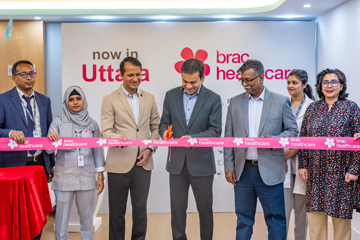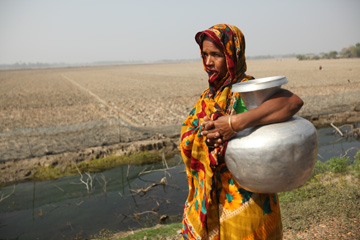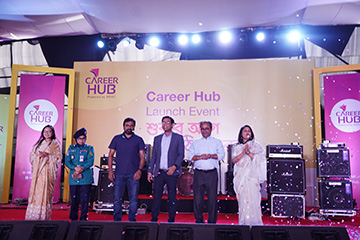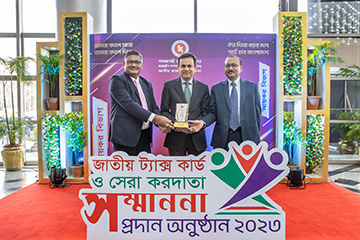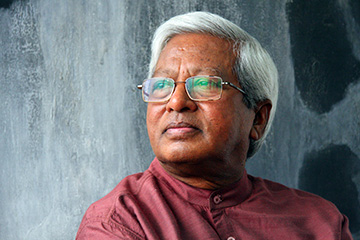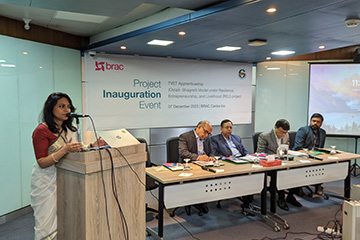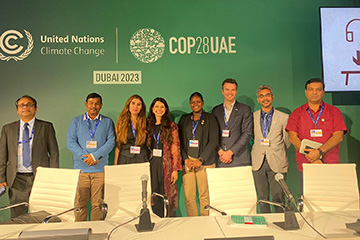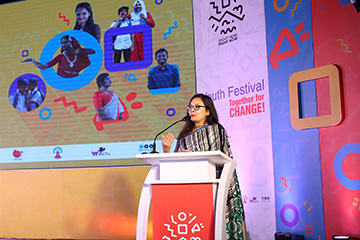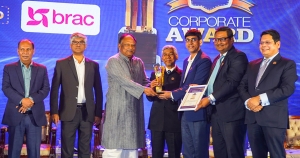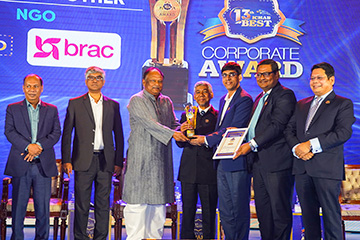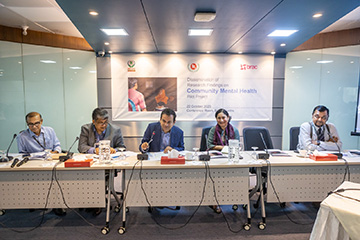
BRAC
BRAC Healthcare Centre is now in Uttara
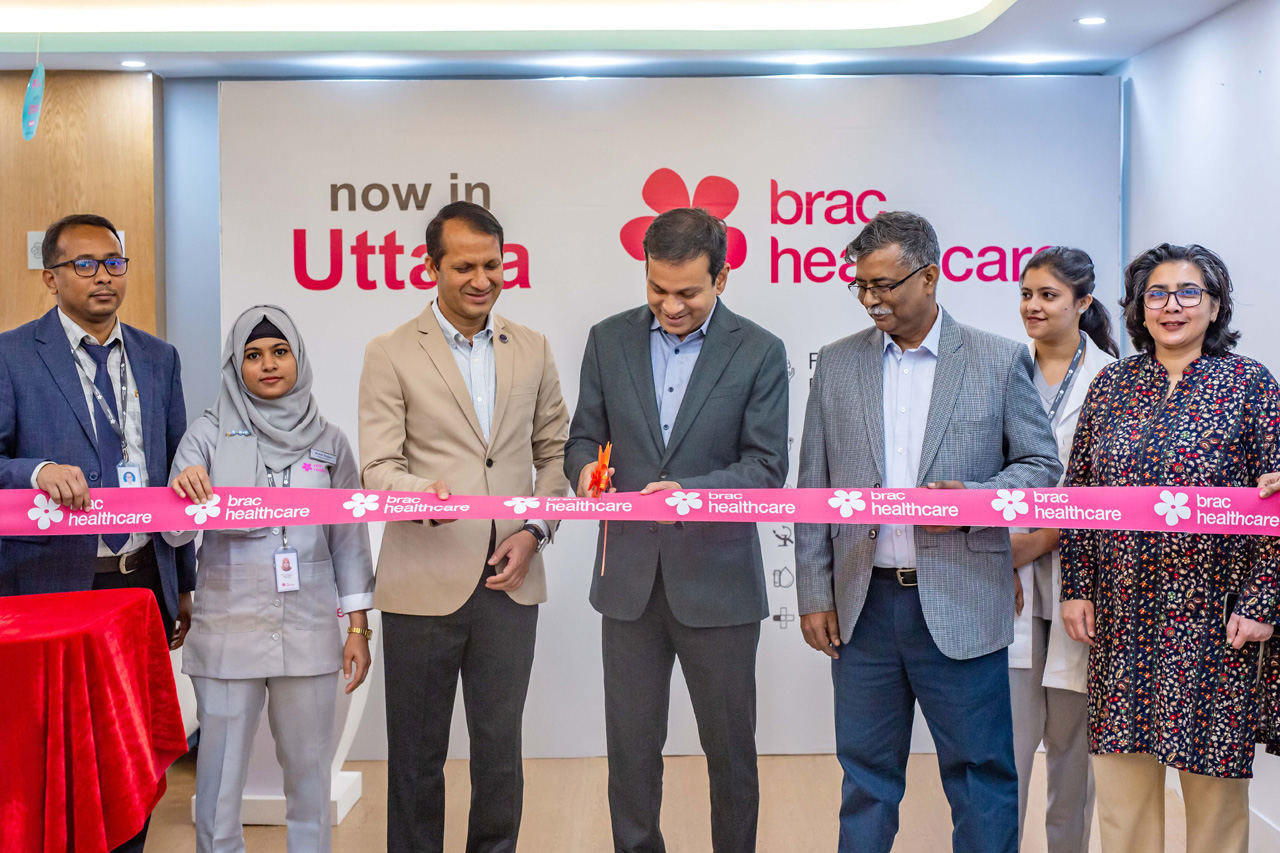
BRAC Healthcare Limited, a concern of BRAC Enterprises, inaugurated its second healthcare centre in Uttara. Asif Saleh, Executive Director of BRAC, officially opened the centre, situated at House 15, Road 12, Sector 6, Uttara, Dhaka, on Wednesday, 6 March, 2024.
Focusing on creating a welcoming atmosphere, BRAC Healthcare centres prioritise a client experience characterised by warmth, empathy, and comfort, aiming to replicate the feeling of being cared for by a close family member.
This expansion marks a significant milestone in the healthcare sector as BRAC Healthcare commits to delivering top-tier, patient-centric medical services adhering to the highest ethical standards. Staffed by a team of highly qualified medical professionals, the centre pledges to meet evolving healthcare needs through six key service pillars: Family Physician and First Aid Care, Doctor Consultations, Health and Wellness (Physiotherapy, Mental Health, and Nutrition), Dental Care, and Diagnostics. The centre also hosts a government-registered model pharmacy, offering access to safe medicines at competitive prices with experienced Pharmacists ready to dispense medication to clients.
In the opening ceremony, Asif Saleh, the Executive Director of BRAC, emphasised, " We acknowledge the prevailing notion that quality healthcare services are often unattainable during emergencies. However, if achieved, it is considered a blessing. We are committed to changing this reality. Patient-centric medical care is our guiding principle at BRAC Healthcare."
Expressing optimism, he remarked, “While it may not be feasible for us to reach the entire population, we aspire to set a standard with the quality of medical services provided by BRAC Healthcare. I hope that witnessing BRAC's exemplary medical care will inspire others to elevate their standards, leading to a positive transformation in the entire healthcare sector.”
Mohammad Anisur Rahman, Senior Director, BRAC Enterprises, stated, "Throughout the one-year journey, our primary objective was to deliver high-quality service to our patients, ensuring a positive experience for them. We believe that we have largely succeeded in this endeavour. Over 90 per cent of individuals who have accessed healthcare from Kazipara centre expressed high satisfaction with our service delivery process.”
Equipped with cutting-edge imaging technology, including X-ray and Ultrasonography (USG), as well as a full-fledged laboratory, the centre promises to deliver timely and accurate test results. BRAC Healthcare's comprehensive dental services encompass regular check-ups, teeth cleanings, cosmetic fillings, tooth extractions and more.
After the successful launch of its first centre at Kazipara in March 2023, BRAC Healthcare served more than 11,000 patients, with 50 per cent of them being women and around 22 per cent below 15 years of age. These patients, and their families, hailed from various socio-economic backgrounds.
This year, BRAC Healthcare plans to extend its services and establishing more centres in various parts of the city and across the nation in the future, aiming to bring positive transformations to the lives of the middle-income population.
The newly inaugurated centre, located at House 15, Road 12, Sector 6, Uttara, Dhaka, is now open for appointments and patient services. For more information about BRAC Healthcare and its services, please visit www.brachealthcare.com, or dial 8809678191911.
Business Unusual – Can we collectively fix financing for locally-led adaptation?
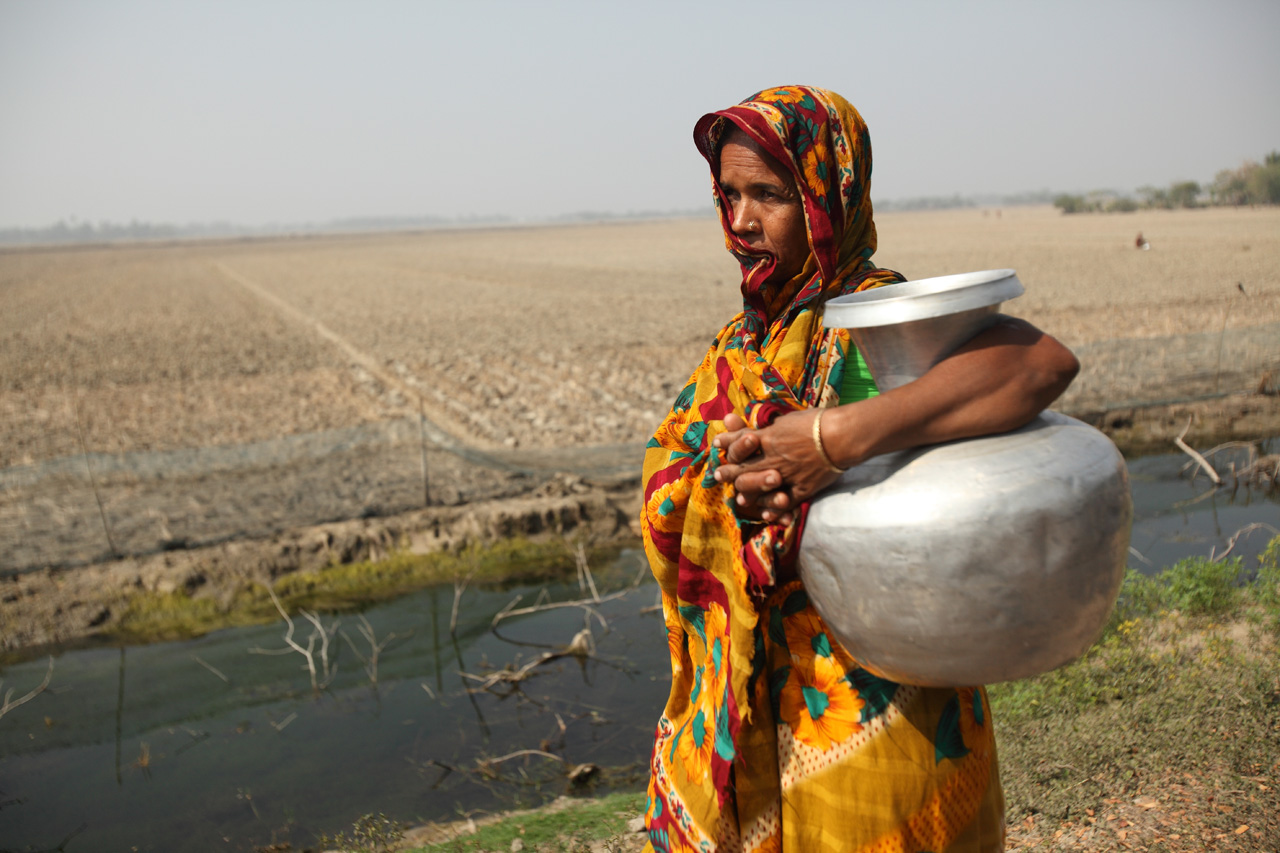
Written by May Thazin Aung, Saqib Huq and Isabel Whisson
Adaptation finance is failing local actors at the frontlines of climate change. A very small proportion of funds disbursed by providers of climate adaptation finance arrives at the local level after being channelled through layers of international intermediaries.
This meagre amount is incredibly hard for local actors to both access and use towards climate action as financing comes with numerous conditionalities encoded into provider’s and intermediaries’ operational rules and policies. For local organisations, these policies translate to confusing eligibility criteria, lengthy applications, rigid due diligence procedures and detailed financial and impact reporting.
It is vital that adaptation finance institutions transform institutional processes within their bureaucracies towards a more business unusual approach. This will require critical introspection around evaluating, absorbing and distributing risk - reputational, financial and political.
Multilateral funds and bilateral donors have stated their commitment to addressing these roadblocks. However, institutionalising change throughout complex bureaucracies in a way that reflects needs on the ground in communities affected by climate change, entails a thoughtful and inclusive process that needs to involve local actors directly tackling the issues being addressed.
BRAC, IIED and ICCCAD have been championing the shift towards an inclusive ‘business unusual’ approach to climate action along with leaders of federated grassroots and regional organisations from the global south. This month at the Fourth Global Gobeshona Conference, BRAC, ICCCAD and IIED are launching a joint initiative to engage stakeholders across the adaptation finance delivery chain, from bilateral donors, to funds, to local civil society actors to understand what the key bottlenecks are and how they may be ameliorated.
Gobeshona’s Keynote Discussion, ‘Business Unusual - How can we make financing for LLA more accessible?’ at 06:00 pm Bangladesh Standard Time (12:00 pm GMT) on Thursday 7 March, will initiate a discussion and share a survey to help us gather insights from both local civil society organisations working on the frontlines of climate change, as well as climate adaptation funders on the key challenges both sets of constituencies face in either accessing or simplifying climate adaptation financing.
We will use the findings to work with all relevant actors to identify a practical set of options that reflect the needs and priorities of local implementers engaged in the adaptation financing chain - among whom we share a common goal: to maximise the ability of climate-vulnerable communities to adapt to the climate crisis.
The survey will remain open until 30 April.
BRAC Career Hub launches in Khulna
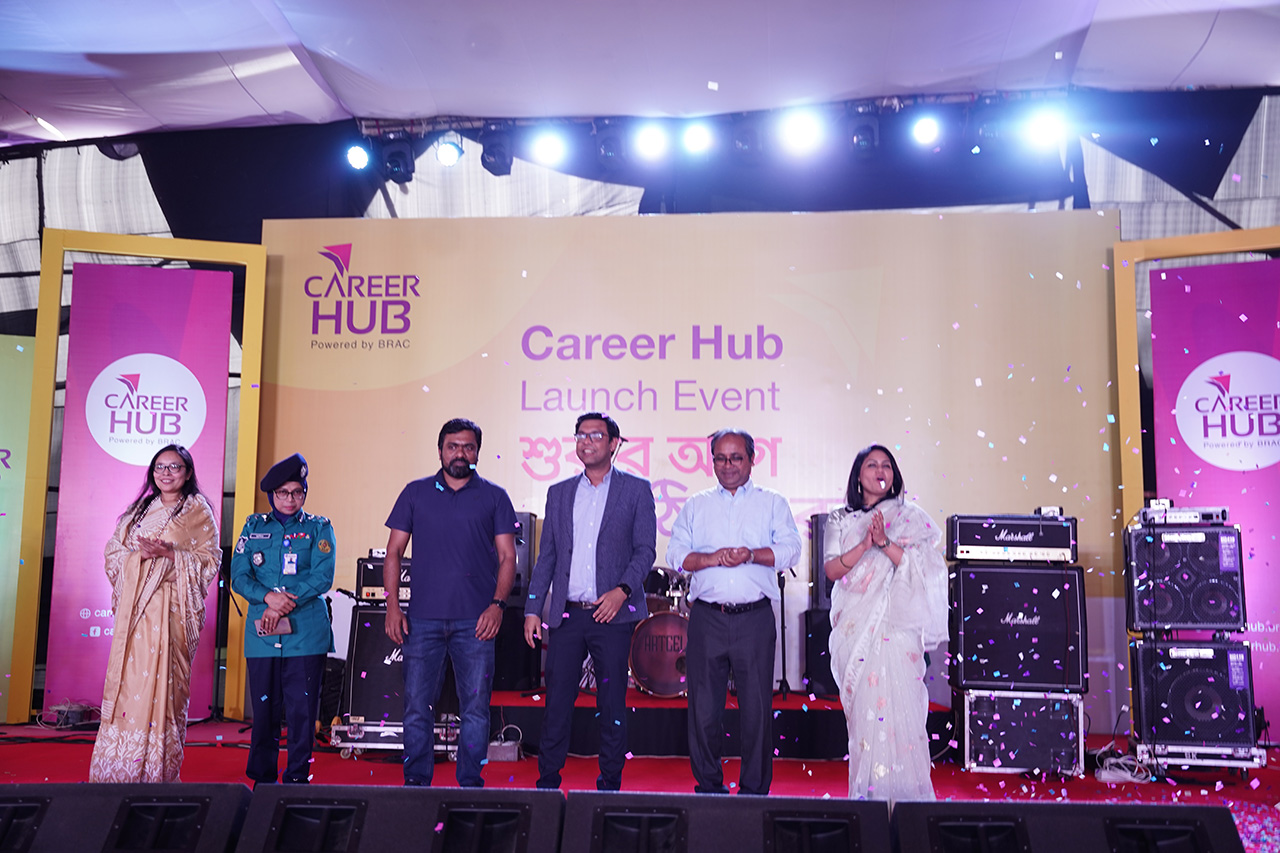
BRAC has inaugurated a Career Hub in Khulna, signifying a significant effort to connect job seekers with employers, thereby fostering an effective relationship between the two.
The launch event for the Career Hub, organised by BRAC's Skills Development Program (SDP) with support from KFW, took place at the Mohila Krira Complex in Khulna on Saturday, 24 February 2024.
Rashida Begum, Additional DIG, Khulna Metropolitan Police was present as Honourable Guest at the event. In addition, BRAC's Senior Director, People, Culture and Communications, Moutusi Kabir; Head of Secretariat, Climate Bridge Fund, Dr. Mohammad Golam Rabbani; Associate Director, BRAC Skills Development Programme, Tasmiah Tabassum Rahman; and Programme Manager Shahriar Islam was also present at the event.
Rashida Begum, Additional DIG, Khulna Metropolitan Police stated, "Job interviews often inquire about prior experience, yet even in the absence of such, opportunities for skills development are available through the career hub. This avenue subsequently aids job seekers in exploring a range of employment possibilities."
In her inaugural speech, Moutushi Kabir, BRAC's Senior Director, People, Culture and Communications, said, “Consider Career Hub as your ally in advancing your career, your reliable resource for addressing all career-related inquiries. Here, you'll find guidance on shaping a prosperous life post-education. BRAC Career Hub endeavours to establish connections with available job opportunities, cultivate essential skills for recruitment assessments, and bolster the confidence of aspiring job seekers.”
Tasmiah Tabassum Rahman, Associate Director, BRAC Skills Development Programme said, “There are three primary reasons why a student may fail to secure employment matching their qualifications upon completing their studies: inadequate job information, insufficient career guidance, and limited job opportunities. Career Hub aims to address these concerns by providing guidance and support to job seekers in navigating these challenges.
The main attraction of the second part of the opening ceremony was the mesmerising performance of Artcell.
According to Bangladesh Bureau of Statistics (BBS) 2022 data, the current unemployment rate in the country stands at 3.53 per cent. The labour force survey-2022 published by the BBS indicates that the rate of Bachelor's degree holders in the country has increased from 11.2 per cent in the fiscal year 2017 to 12 per cent in 2022. The survey also reveals that the number of unemployed graduates has nearly doubled in these five years, reaching around 400,000 in 2017.
An analysis of government data from the last few years shows that more than 2 million youth enter the workforce every year in the country with little or no practical knowledge and skills. A 2021 survey conducted by the Bangladesh Institute of Development Studies (BIDS) states that 66 per cent of National University graduates are unemployed. Many jobseekers have never received career counselling or guidance, hindering their ability to develop skills according to employers' needs.
The situation is particularly challenging for women and persons with disabilities due to fewer opportunities to acquire expected skills, negative social attitudes, limited movement opportunities, and societal pressure.
In response to this scenario, employers are also seeking skilled manpower. Taking this into consideration, BRAC initiated this endeavour by establishing career hub centres in Rangpur and Sylhet in 2020. Subsequently, the fourth career hub was opened in Chattogram in 2023, and now in Khulna.
An online platform has also been launched to reach the youth more intensively. Plans are underway to open Career Hub centres in Cox's Bazar and Dhaka this year. This event in Khulna marks the launch of Career Hub services and related facilities for youth, employers, government partner institutions, and other relevant authorities.
BRAC achieved recognition as the leading contributor to tax revenue
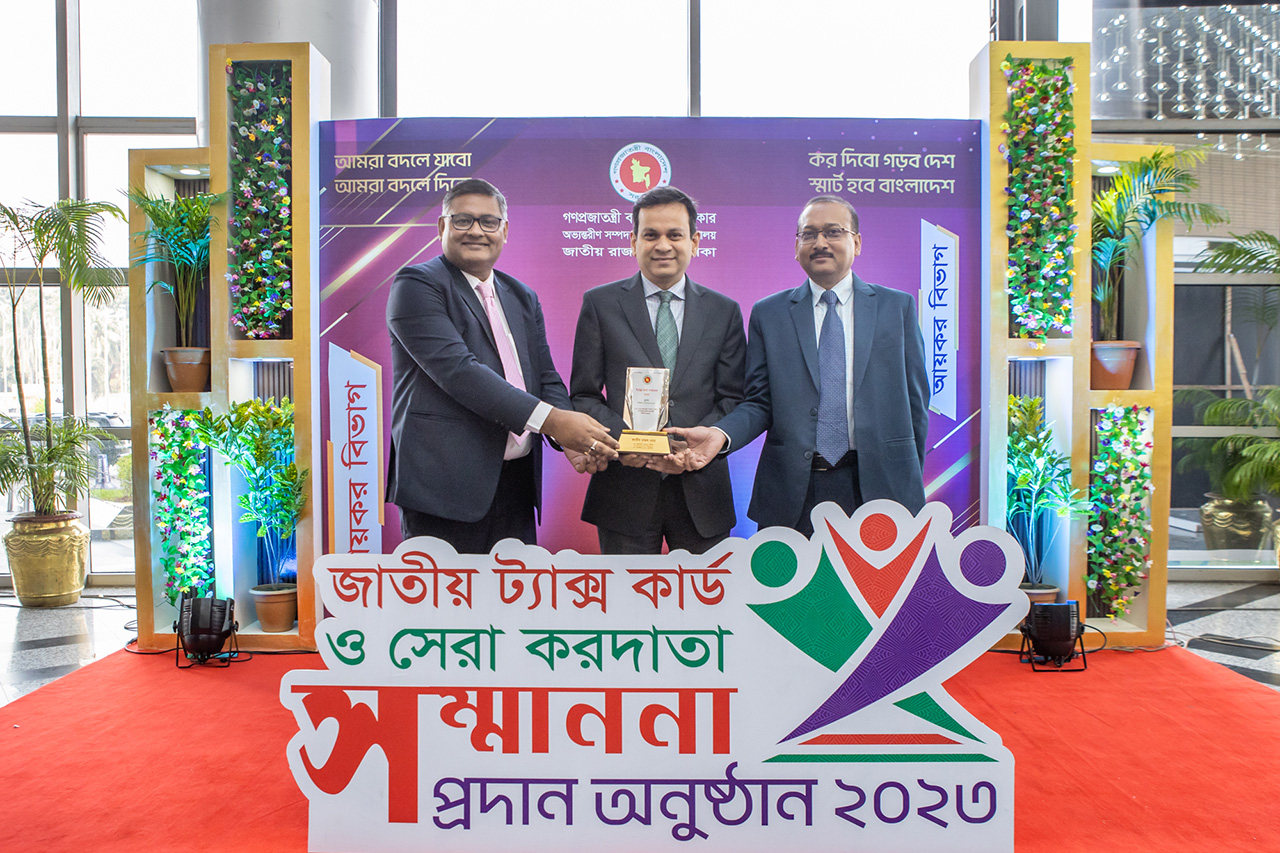
In the fiscal year 2022-23, BRAC achieved recognition as the leading contributor to tax revenue. The National Board of Revenue (NBR) bestowed this honour on Wednesday, 20 December 2023. NBR Chairman, Abu Hena Md. Rahmatul Muneem presented the accolade to BRAC's Executive Director, Asif Saleh, during the National Tax Card and Best Taxpayer Awards ceremony held at the Bangabandhu International Conference Center. Tushar Bhowmik, Chief Financial Officer (CFO) and Ashit Baran Das, Associate Director, BRAC, were present.
A total of 141 individuals and organisations received tax cards from the NBR as a tribute to their outstanding contributions as the best taxpayers.
Sir Fazle Hasan Abed’s 4th death anniversary today
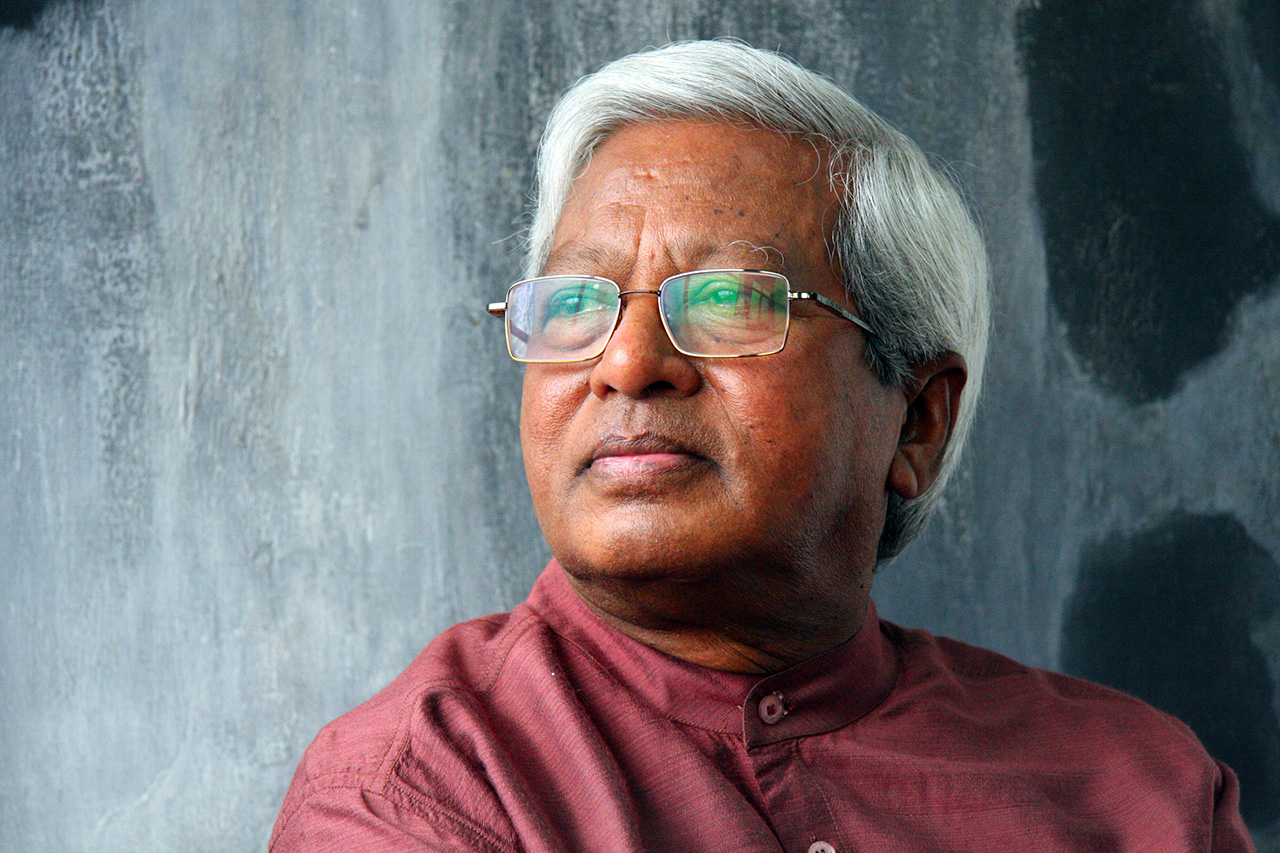
Today (Wednesday, 20 December 2023) is the 4th death anniversary of Sir Fazle Hasan Abed, the visionary leader and founder of BRAC, the largest NGO of the world, who passed away on this day in 2019. Sir Fazle Hasan Abed died at the age of 83, while undergoing treatment at a hospital in Dhaka. He established BRAC in 1972, after coming back from London, as a small relief and rehabilitation effort in a remote area of Sylhet.
Subsequently, as part of its enduring development strategy, BRAC initiated an extensive outreach to marginalised segments of society through diverse development initiatives. BRAC has devised a comprehensive development strategy aimed at empowering the underprivileged, encompassing initiatives in areas such as healthcare; education; microfinance; skills development; agriculture; and food security; cottage industries; human rights; road safety; migration; and urban development.
Born in 1936, Sir Fazle Hasan Abed studied accountancy in London, qualifying as a cost management accountant in 1962. While he was working as a senior corporate executive at Pakistan Shell Oil, the 1970 cyclone and 1971 Liberation War in Bangladesh dramatically changed the direction of his life.
After the onset of the War of Liberation, he resigned from his position and moved to London. There, he played a pivotal role in launching "Action Bangladesh" and "HELP Bangladesh", offering support for the Liberation War.
In 1972, after the war was over, he returned to the newly-independent Bangladesh, finding the economy in ruins. The return of 10 million refugees, who were sheltered in India during the war, called for urgent relief and rehabilitation.
Sir Fazle Hasan Abed then founded BRAC to address the needs of the refugees, guided by a desire to help people living in poverty develop their own capacity to better manage their lives. BRAC transformed itself to one of the largest and most effective NGOs in the world by conducting successful socio-economic programmes in many sectors over the last 50 years. BRAC now provides multifaceted services to over 100 million people in 11 countries of Asia and Africa, assisting them in bringing lasting changes to their lives.
Awards and Recognition
For his outstanding contributions to empowering people living in poverty and inequality, Sir Fazle Hasan Abed had been honoured with numerous national and international awards including the Yidan Prize for Education Development (2019), Dutch Royal Knighthood (2019), LEGO Prize (2018), Laudato Si' Award (2017), Jose Edgardo Campos Collaborative Leadership Award, South Asia Region (2016), Thomas Francis, Jr. Medal in Global Public Health (2016), World Food Prize (2015), Trust Women Hero Award (2014), Spanish Order of Civil Merit (2014), Leo Tolstoy International Gold Medal (2014), CEU Open Society Prize (2013), Inaugural WISE Prize for Education (2011), Entrepreneur for the World Award (2009), David Rockefeller Bridging Leadership Award (2008), Inaugural Clinton Global Citizen Award (2007), Henry R. Kravis Prize in Leadership (2007), Palli Karma Shahayak Foundation (PKSF) Award for lifetime achievement in social development and poverty alleviation (2007), UNDP Mahbubul Haq Award for Outstanding Contribution to Human Development (2004), Gates Award for Global Health (2004), Gleitsman Foundation International Activist Award (2003), Schwab Foundation’s Social Entrepreneurship Award (2003), Olof Palme Prize (2001), InterAction Humanitarian Award (1998) and Ramon Magsaysay Award for Community Leadership (1980).
He is also recognised by Ashoka as one of the 'global greats' and is a founding member of its prestigious Global Academy for Social Entrepreneurship. In 2009, he was appointed Knight Commander of the Most Distinguished Order of St. Michael and St. George by the British Crown in recognition of his services to reducing poverty in Bangladesh and internationally. Sir Fazle was a member of the Group of Eminent Persons appointed by the UN Secretary-General in 2010 to advise on support for the Least Developed Countries. In both 2014 and 2017, he was named in Fortune Magazine’s List of the World’s 50 Greatest Leaders.
The many honorary degrees received by Sir Fazle Hasan Abed include those from Princeton University (2014), the University of Oxford (2009), Columbia University (2008) and Yale University (2007).
Empowering disadvantaged youths through skill training and employment opportunities
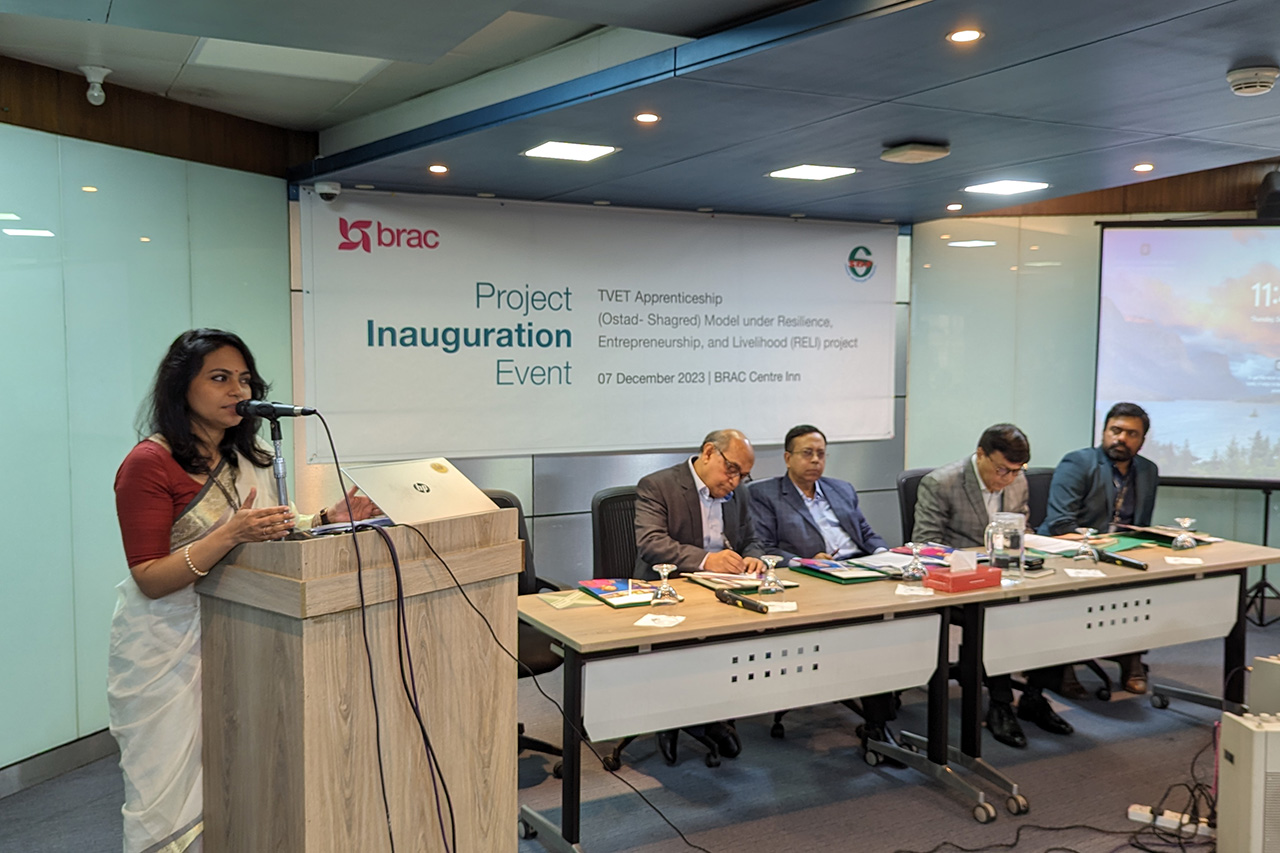
80% subsequently finding employment with 62% of trained girls avoiding early marriage.
BRAC has extended its successful non-formal apprenticeship model, Ustad-Sagred, to provide training and employment opportunities to 1,500 disadvantaged youth in rural areas. The 'Resilience, Entrepreneurship and Livelihood (RALI)' project by the Social Development Foundation (SDF) under the Ministry of Finance has endorsed the 'Ustad-Sagred' model and collaborates with BRAC to provide the training.
The introduction of BRAC's non-formal apprenticeship model, Ustad-Sagred, is aimed at fostering employment opportunities by enhancing the skill development of young men and women who have discontinued formal education. Since its inception in 2012, the 'Ustad-Sagared' model has effectively contributed to youth employment by elevating their skills through hands-on and practical training methodologies.
The official launch event, titled 'Technical and Vocational Education and Training' (TVET) apprenticeship or Ustad-Sagred Project, took place on Thursday, 7 December 2023, at the BRAC Centre in Mohakhali, in the capital. The event was jointly organised by BRAC and SDF and attended by high-officials, including SDF Chairperson Md. Abdus Samad and Managing Director Dr. Amitabh Sarker.
Tasmiah Tabassum Rahman, Associate Director of BRAC's Skill Development Programme and Dr. Amitabh Sarker delivered the opening speeches, emphasising the significance of practical training in boosting the employability of young individuals who have discontinued formal education. Rezaul Mazid, the project manager of BRAC’s Skills Development Programme (SDP), concluded the event, while Dr. Zafar Ahmed Khan, senior policy advisor of BRAC, also addressed the attendees, expressing optimism about the project's success and its potential for future expansion.
BRAC and SDF officials expressed their collective aspirations for the continued success of the Ustad-Sagred model and anticipate its expansion, significantly contributing to skill development and employment generation for the youth in Bangladesh.
The Ustad-Sagred model, initiated in 2012 under the 'Skill Training for Advancing Resources (STAR)' programme, focuses on imparting hands-on training to individuals aged 14 to 22 who have left the formal education system. The programme has been notably effective compared to conventional training systems, leading to increased employment opportunities for the youth.
Under the STAR programme, currently active in 52 districts across the country, over 120,000 individuals have received training, with a remarkable 80% subsequently finding employment. Notably, 60% of the trainees are women, and 10% are individuals with physical challenges. The programme has also played a pivotal role in preventing child marriages, with 62% of trained girls avoiding early marriage.
Moreover, the Ustad-Sagred model has successfully trained over 45,000 Ustads (instructors) who actively contribute to various small businesses. This symbiotic relationship between instructors and trainees has fostered learning in practical skills, workplace beautification, and gender awareness, turning the Ustads into proficient trainers.
COP28: Global South organisations advocate for increased funding in locally-led adaptation

Local organisations from Global South are calling for increased funding for locally-led adaptation to enhance and maximise impacts at the local level.
This demand was voiced by speakers representing various local organisations from the Global South at the COP28 Official Side Event hosted by BRAC, titled, ‘Financing Locally-Led Adaptation – Translating Global Ambition into Local Impact’. The event took place on Tuesday, 5 December, 2023, at Side Event Room 2 of COP28 venue in Dubai. Representatives from the international donor community were also present at the programme.
Watch the recording of the session:
Special Envoy to the Prime Minister of Bangladesh for Climate Change Saber Hossain Chowdhury MP, stated, "For us, knowledge to adapt to the climate crisis is not the latest chip from Silicon Valley; it is what communities have known for years. We must leverage that before we reach the bounds of resilience."
Climate Action Network - South Asia’s Director, Sanjay Vashist said, "Investments and carbon bonds are for the market; climate grants are for the people. If we really want money to reach the people, it must be in the form of grants and not loans or investments."
Climate Bridge Fund Secretariate Head, Dr Golam Rabbani said, "Countries like Bangladesh are receiving only 3% of the funding they need to adapt. But what about the other 97%? They are the ones with whom the Climate Bridge Fund is working."
FCDO’s Adaptation and Resilience Head, Peter Bentley said, “If donors are trying to manage risks to the extent that they are not dispersing climate finance, it doesn’t help the donors. We don’t want to see that because we also want climate finance to reach the ground.”
Renae Baptist, First Secretary, Permanent Mission of Geneva to the UN Saqib Huq, Managing Director, ICCCAD; Subir Kumar Saha, Coordinator, Gana Unnayan Kendra; and Zoya Shabir Siddiqui, Development and Partnerships Manager, Acumen, participated at the event. The event was moderated by Isabel Whisson, Head, Policy Initiatives, BRAC.
The primary objective of the event is to initiate a constructive dialogue with the global donor community on improving the delivery of funding, thereby, imroving climate resilience at the local level. The event also aims to share practical insights and suggestions from Bangladesh with other climate-risk countries, both from the North and the South, on how to effectively enable locally-led adaptation within their own contexts.
More than 300 bright young minds join the Youth Festival at Krishibid Institution
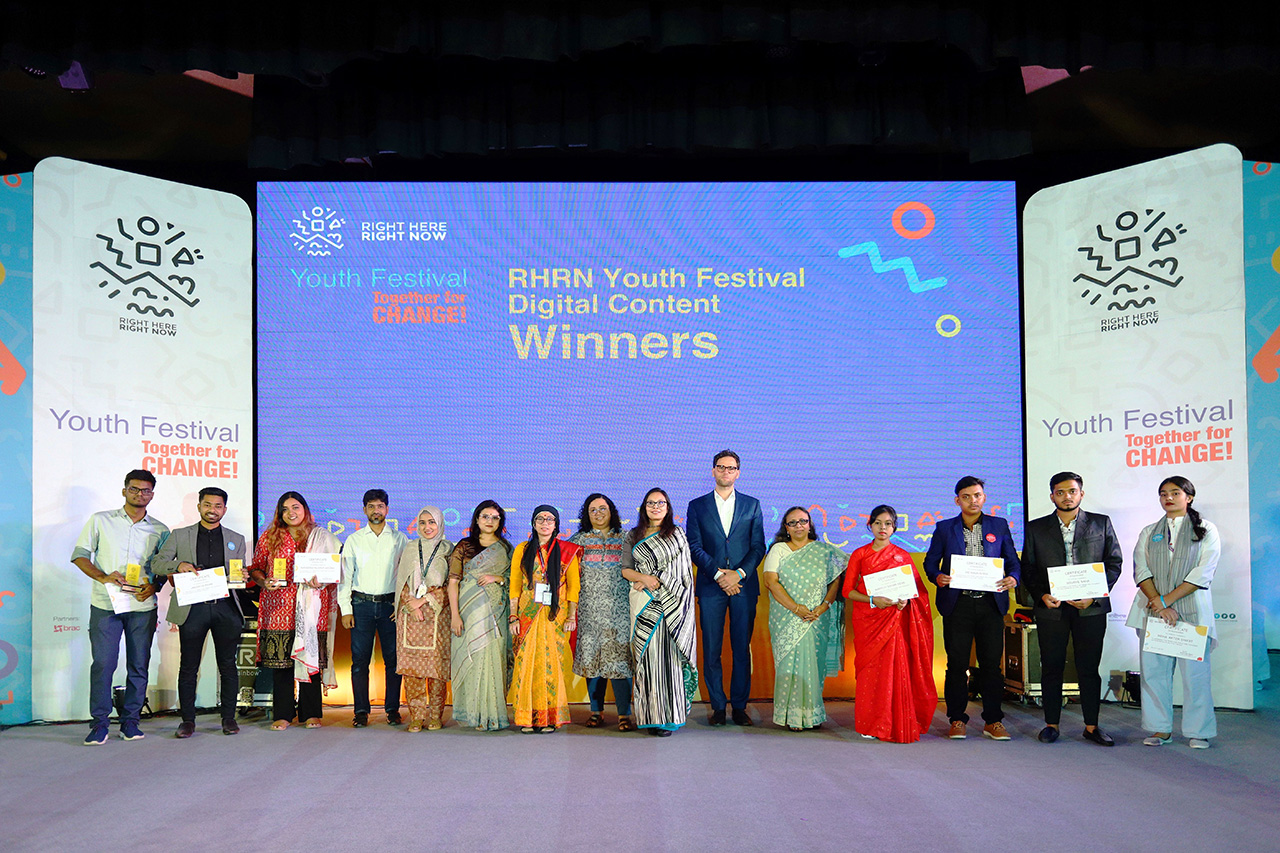
The premises of the Krishibid Institution echoed with the energetic strides of more than 300 youths from across the country who gathered to participate in the Youth Festival on 26 November 2023. Organised by the Right Here Right Now (RHRN2) project of BRAC's Social Empowerment and Legal Protection (SELP) Programme, the purpose of the event was to engage bright young minds in conversations on child marriage, gender-based violence, sexual and reproductive health and rights, and gender equality.
BRAC’s Senior Director for People, Culture, and Communications, Moutushi Kabir expressed her thoughts in the inauguration session by saying, "In the educational or social environment in which we grow up, we are not informed about the right to question, especially when it comes to sexual or reproductive matters. Any young man and woman has questions. However, socially, these questions are often suppressed or deemed inappropriate. Perhaps, it is implied that discussing such matters is a thing of shame and should be discussed. She added, "It is nice to observe your open-mindedness in posing questions here. By questioning your rights, you contribute to the potential for change. Without such questioning, how can progress occur? How can an equitable world be established?"
First Secretary - Human Rights, Humanitarian Affairs and Gender of Embassy of the Kingdom of the Netherlands, Jan Swillens also shared insights into the significance of the event. He expressed that youth and adolescents can utilise social media as a powerful tool to bring about social change and ensure gender justice. He further emphasised, "The contemporary world extends beyond national borders; we are, in fact, global citizens. This means that our ideas and initiatives have the potential to instigate change not only within our country but on a global scale.
Md. Masudur Rahman, National Coordinator, RHRN Bangladesh Coalition, stated, "We have provided direct leadership development training to almost 1,000 young individuals. Additionally, we have collaborated with 25,000 students across various secondary and higher secondary schools, offering training to enhance their awareness of gender equality and address issues related to sexual harassment.
The day-long programme featured a thought-provoking panel discussion titled ‘Implementing Comprehensive Sexuality Education in Bangladesh - Challenges and Way Forward’. Representatives from government, Non-Governmental Organisations, Sexual and Reproductive Health and Rights (SRHR) experts, and a youth volunteer actively participated. Additionally, a participatory session on 'Understanding Gender, Feminism, and Countering Backlashes' was facilitated by Nazia Zebin, Executive Director, Oboyob, and Shashwatee Biplob, Programme Head and In-Charge of Social Empowerment and Legal Protection (SELP) Programme at BRAC.
One of the panelists, Mazharul Huq Masud, Assistant Director of Training-1 at the Directorate of Secondary and Higher Education (DHSE), stated that the effective implementation of the new curriculum will only be possible through collaborative efforts from students, parents, teachers, community members, and especially civil society organisations working towards the sustainable education and reproductive health of the future generation.
In the afternoon, the theme of gender equality and feminism was creatively highlighted through fascinating artwork by the renowned artist and social media influencer Morshed Mishu.
The programme concluded with a closing remark by Dr. Tasnim Azim, President, Naripokkho.
The cultural programme, presented by the youth member of RHRN, Lalmonirhat, and a captivating performance by musician Minar, added an entertaining touch to the festival.
The RHRN project, a multi-country coalition led by BRAC in Bangladesh, is funded by the Ministry of Foreign Affairs of the Kingdom of the Netherlands and executed by Rutgers. In its second phase (RHRN2), spanning from 2021 to 2025, the project operates in 10 countries worldwide, including Bangladesh. Coalition members of this projects in Bangladesh include Nagorik Uddyog, Naripokkho, Oboyob, Wreetu, and Youth Policy Forum (YPF), with BRAC as the lead. RHRN seeks to amplify the voices of young people and strengthen the agency of girls, young women, young people in all their diversities, including those who are gender-diverse, and other groups living in vulnerable situations.
BRAC won Gold Award in the ICMAB best corporate award

BRAC, recognised as the number one development organisation in the world, has been awarded the prestigious Gold Medal, securing the 1st position in the NGO Category at the Best Corporate Award 2022 organised by the Institute of Cost and Management Accountants of Bangladesh (ICMAB). This remarkable achievement marks the sixth time BRAC has received this prestigious award.
The award was presented by the Chief Guest, Tipu Munshi MP, Honourable Minister of the Ministry of Commerce. The ceremony took place on Tuesday, 7 November, 2023, in the Grand Ballroom, Pan Pacific Sonargaon Hotel in Dhaka. Nanda Dulal Saha FCA, Director, Internal Audit at BRAC and BRAC International; along with Ashit Baran Das, Associate Director (Finance & Accounts) of BRAC, received the award on behalf of the organisation.
Tapan Kanti Ghosh, Senior Secretary of the Ministry of Commerce; Professor Shibli Rubayat-Ul-Islam, Chairman, Bangladesh Securities and Exchange Commission (BSEC); and Md. Hamid Ullah Bhuiyan, Chairman, Financial Reporting Council (FRC) were present as the special guests.
BRAC has received numerous awards for the financial transparency over the years, including the Institute of Chartered Accountants of Bangladesh (ICAB) National Award, the ICMAB Best Corporate Award, and the prestigious South Asian Federation of Accountants (SAFA) award for best-presented annual report, in the NGO category.
Mental health pilot intervention shows promising results at the community level
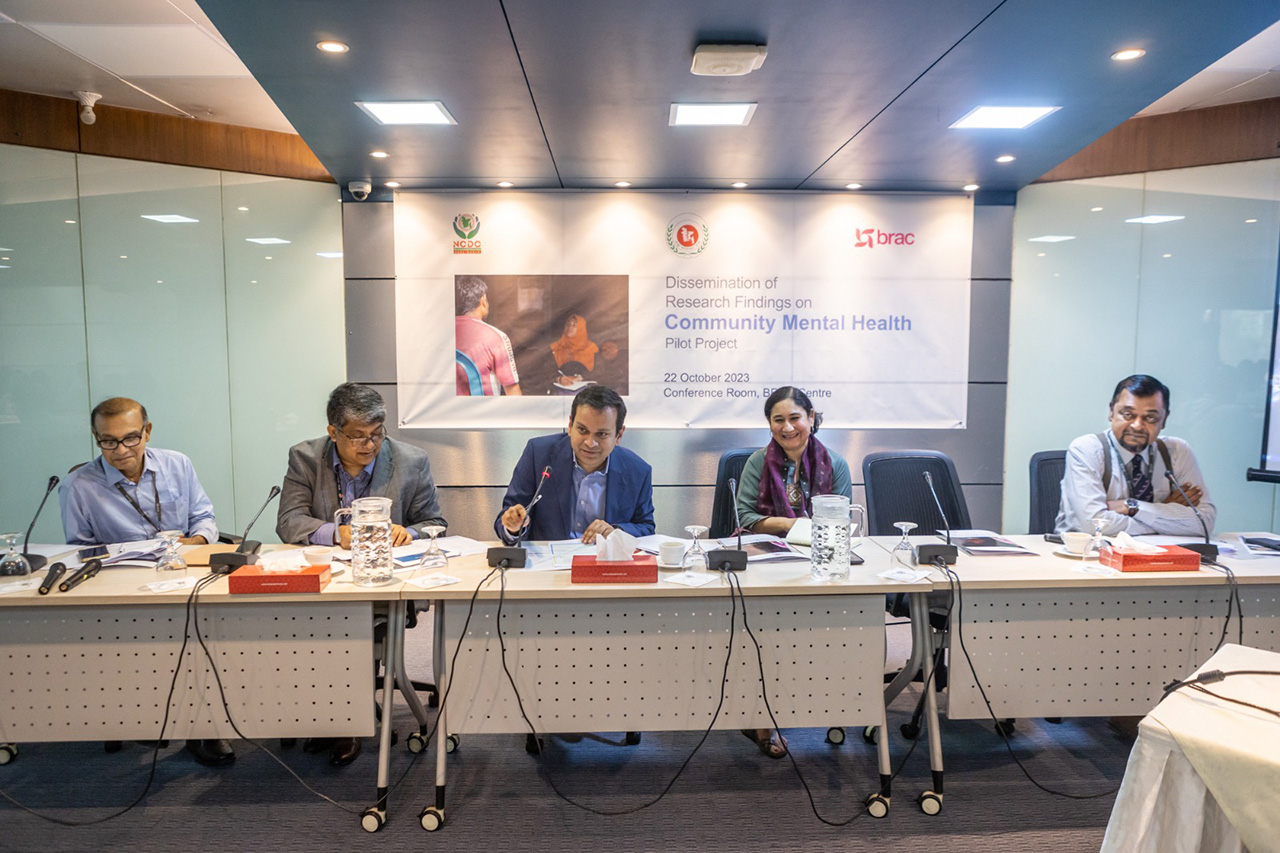
Bangladesh is grappling with an alarming rise in mental health disorders, with a prevalence rate of 18.7% and a daunting treatment gap of 92.4%, as per the 2019 National Mental Health Statistics (National Mental Health Survey 2019). Globally, mental health conditions account for 13% of the disease burden and are projected to increase to nearly 15% by 2030 (United Nations,2022).
In response to this challenge, BRAC, in collaboration with Mental Health Unit of Non-Communicable Disease Control (NCDC) and the Directorate General of Health Services (DGHS), has been working since January 2022 to initiate mental health and psychosocial support and ensure access to mental health services at the grassroots level.
To assess the effectiveness of the intervention, two research studies have been carried out: 1) "Impact Study on Mental Health Pilot Project'' by BRAC Institute of Educational Development (BIED), University of Tokyo, Kanazawa University, and Infant, Child and Family Psychiatrist, Australia; and 2) "Process Evaluation of Mental Health Pilot Project" by Professor Dr. M. Kamruzzaman Mozumder, Department of Clinical Psychology, University of Dhaka.
On 22 October, 2023, two research findings on the mental health pilot project were presented. Experts, government officials, academicians, researchers, and representatives of reputed non- governmental and international organisations related to mental health were present at the event. The focus of the event was to share important findings from the researchers and gather valuable feedback from the guests for future planning. KAM Morshed, Senior Director BRAC, facilitated the discussion.
The research shows that BRAC mental health Para-professionals began with limited knowledge and confidence but improved their skills through training and supervision. They provided a safe and open space for clients to share their thoughts and emotions, resulting in clients feeling emotionally lighter and more at ease, with improved mental health. Clients also learned techniques to manage anger and regulate emotions during sessions. As a result of receiving Psycho-social Support (PSS) from Para-professionals, clients and community members observed positive behavioural changes and improved coping strategies, leading to enhanced emotional understanding and stronger relationships.
Farjana Sharmin, Programme Manager, Clinical Psychology, BRAC Health Programme, shared project details and the intervention process. She also discussed global mental health conditions, Bangladesh mental health status, and the government's initiatives in mental health programmes. The collaboration between the government and BRAC in implementing mental health and psychosocial support at the community level was highlighted.
Prof. Dr. Tabassum Amina from BRAC Institute of Education Development prtesented the findings of the Impact Evaluation of Mental Health Pilot Projec. The project, conducted collaboratively by BIED, University of Tokyo, Kanazawa University, and Infant, Child, and Family Psychiatrist from Australia, revealed the remarkable impact of community-based mental health interventions. The project significantly raised mental health awareness, reduced distress levels, severe psychological distress, depression, and Post-traumatic Stress Disorder (PTSD), while enhancing the quality of life in areas like physical health, psychological well-being, and social relationships.
Professor Dr. M. Kamruzzaman Mozumder, the second speaker, provided a comprehensive process evaluation that highlighted the effectiveness of the training module designed for Para-professionals. Notably, the study emphasises the significance of handholding, supervision, and self-care support in building the skills and confidence of these Para-professionals.
The chief guest Prof. Dr. Mohammad Robed Amin, Line Director, DGHS, emphasised the collaboration between the government and the NGOs. He said, “This project has been highly successful at every step with powerful client satisfaction. BRAC can be part of our existing mental health initiative through the WHO special initiative. In this context, it's important to ensure that mental health services are not limited to intellectual individuals in society but should be made accessible to the local population through Para-professional training. Mental health cannot only be addressed by the government, rather there is a need to collaborate with NGOs.”
The special guest, Hossain Ali Khondokar, Additional Secretary, Ministry of Health and Family Welfare, added, “Superstition can only be tackled through education. It is essential to remember that no health is sustainable without mental health. Thus, I believe now is the time to advocate for a partnership between the government and NGOs in detecting and providing services for mental health issues among the general population.”
Asif Saleh, Executive Director of BRAC said, “This is a significant achievement in the field of mental health, made possible by the government's support and freedom of operation. It's essential to emphasise the principle of ‘Do No Harm’ in mental health, as interventions can sometimes do more harm than good. Care and sensitivity are paramount. The Para-counselor model, a relatively recent concept, has the potential to become a pioneering export from Bangladesh to the global mental health arena.”
The Mental Health Pilot Project is working to contribute to the community-based mental health landscape, significantly enhancing awareness and emphasising the importance of Para-professional capacity development. Its holistic approach enriches individual lives and ensures mental health well-being.
The findings from these two research studies shed light on the positive impact of community-based mental health interventions in Bangladesh. Moving ahead, the intervention remains committed to strengthening mental health support, both locally and as a potential global model.
Join the world’s biggest family

